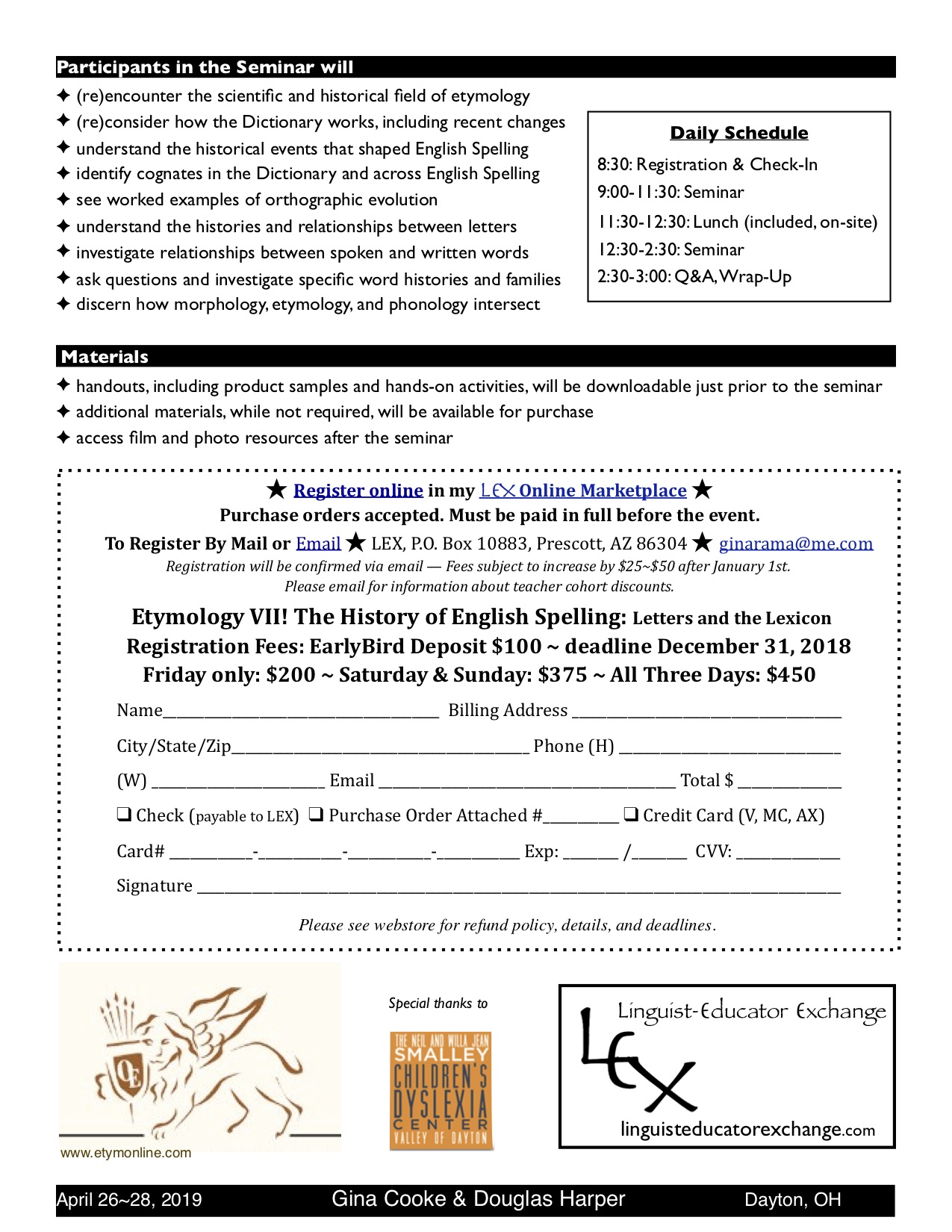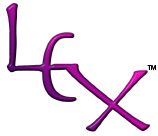Etymology Seven!
Douglas Harper and I began our joint work in 2013 with our first Etymology! conference in greater Philadelphia. That first weekend was an exhilarating and dynamic study of a modern linguistic understanding and the website that cultivates it, carried out on wooden benches in a Quaker meeting house at a Friends School. I remember Doug writing about it afterwards, and likening my analysis of written words to loading and locking a weapon.
The 2013 beginning was just that — a beginning, an introduction to this greater world of etymology for our growing community of orthographic scholars, plus whatever local Pennsylvania teachers were brave enough to join us. We covered the basics of the history of the English language, the basics of the website, and some hands-on study.
Every year since then, Doug and I have put our heads together to pinpoint a single theme for the weekend — we continue to cover the basics, but we focus our lens on a limited time frame or a specific language origin or a particular aspect of linguistic study. The past six years of community scholarship have looked like this:
2013: Etymology! The Science of Word Stories (Philadelphia)
2014: Etymology Two! Word Origins, Word Meaning, and Word Knowledge (Philadelphia)
2015: Etymology Three! The Dictionary, The Dynamics, and the Stories of Words (Chicago)
2016: Etymology Four! Words and Writing: The History and Prehistory of English (San Francisco)
2017: Etymology Five! Philology, Phonology, and the Phylogeny of Words (Chicago)
2018: Etymology Six! Middle English: From the Battle of Hastings to the Wife of Bath and Beyond (Portland, OR)
This year? Lucky Number Seven? It’s all about Spelling.
2019: Etymology Seven! The History of English Spelling: Letters and the Lexicon
We will take a close look at the history of English Spelling, including the who (from King Alfred to Noah Webster), the what (from the Old English alphabet to modern-day abbreviations), the when (from the Norman Invasion to the Great Vowel Shift), and how (from the Printing Press to the Digital Age). We will study the Dictionary to see how we can understand orthography better from its entries, including bold new graphic timelines that depict the evolution of a written word.
But words aren’t the only thing that evolves: so do communities. Over the years of our joint work, our shared audience has grown (Doug’s own audience is huge; I’m referring to the folks who work with the two of us together, by and large), and we have established a critical mass of participants who are not beginning, but continuing their serious study of Etymology and English Spelling. Each year to this point, we’ve begun our study with Etymology Basics, to introduce or review foundational concept and to ensure a common understanding among the audience members.
Last year, for the first time, it became apparent that our core group of scholars — the weirdos who follow us around the country and spend time studying with us and somehow still manage to like not only Doug, who is immeasurably likable, but also me — had really already internalized the basic understanding of etymology and the dictionary that we were offering for the first several hours of the conference. A couple of said weirdos prevailed upon us last year to please consider separating out the introductory material and offering opportunities for deeper study in 2019.
So that’s what we’re doing.
This year, Doug and I are offering a new, 3-day conference format, with attendance options for people new to this study (Etymology Basics), as well as options to continue pursuing a deeper understanding.
We are back in the Middle West at the Historic Dayton Masonic Center in Dayton (of course), Ohio. On Friday, April 26th, we will offer a five-hour Etymology Basics seminar for beginners and anyone who’d like a refresher on synchronic and diachronic etymology and the structure and flow of the Online Etymology Dictionary. On Saturday and Sunday, we will delve into this year’s specific theme and offer a 10-hour, 2-day seminar on the History of English Spelling. Beginners who have attended Friday’s session are welcome to stay through the weekend! Veteran etymologists — those who have attended past Etymology weekends and/or the Etymonline Online LEXinar, may join us for the weekend only, without attending Friday’s session. In sum, beginners have the option to attend Friday only, or the full 3-day conference. Veterans may also attend all three days, or they may skip Friday and come for only the Saturday-Sunday conference.
Based on evaluations from past seminars, we are streamlining the agenda for this year’s seminar. We will continue to provide lunch on-site, but each day ends by 3pm to allow for processing, local color, rest, and time to travel home. Continuing Education contact hours will also be offered, either 5 for Friday only, 10 for Saturday-Sunday, or 15 for the full 3-day weekend. Local hotel and transit options will also be made available to those who register.
I am currently offering an EarlyBird Special: Pay a refundable $100 deposit on or before December 31st, and lock in the following discounted rates to register later:
$200 : Friday Only ~ $375 : Saturday & Sunday ~ $450 : All Three Days
This pricing means that the full, 3-day conference is only $75 more than last year’s (and this year’s) 2-day conference, and that includes lunch! It also means that the price of the 2-day conference has not increased. In fact, this basic cost has decreased since our most costly conference in San Francisco 3 years ago. These rates are much, much lower than the 1, 2, or 3-day conferences by professional organizations where speakers routinely lie to you about your own language.
Sounds like a bargain.
These rates are subject to increase on or after January 31st by $50-75, depending on what pricing information comes in from caterers and the venue, but you can lock them in now by making a refundable $100 deposit. (Terms and conditions apply.) There’s nothing to lose, and money to be saved. These EarlyBird registrations also really help me with planning the event, so if you know you want to go, please sign up with a deposit today.
I’m not yet sure whether I will be able to offer an online attendance option yet or not, but I will post more as I learn more. I *am* sure that this year’s conference will be of maximum benefit for those who have received their new LEX Grapheme Decks and are fascinated by the new etymological content, as it will be informing what I present.
The understanding is right here for the taking. Understand Etymology! Understand the Online Etymology Dictionary! And understand English Spelling better, for one, two, or three days in Dayton in April 2019.



5 Comments
Will you be offering a virtual reality conference connection in Ohio? At this time, I have registered for the Orthography in the Classroom conference in Downers Grove.
>
I don’t know yet whether there will be an online option.
We will not be offering an online option for this conference.
Gina,
I would like to attend all three days.
Benita Belsley
Benita, you have to go to the link and register. I can’t save you a spot from a blog comment.